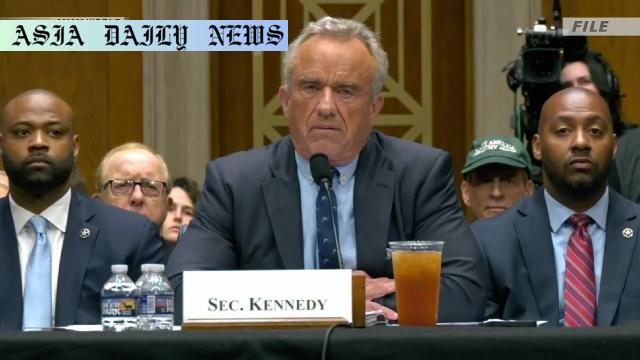Vaccine advisory panel gets a fresh start as Robert F. Kennedy Jr. replaces all 17 members with new highly credentialed experts.
- Health Secretary Robert F. Kennedy Jr. replaces all 17 members of the advisory panel.
- Eight new experts appointed, including respected scientists and physicians.
- Some critics raise concerns over alleged misinformation linked to one new appointee.

US Health Secretary Revamps Vaccine Advisory Panel
The U.S. Health Secretary, Robert F. Kennedy Jr., has made sweeping changes to the country’s vaccine advisory landscape by dismantling the existing Advisory Committee on Immunization Practices (ACIP) and appointing eight new members. This monumental decision has caused ripples across public health spheres, as the ACIP is a key body advising the Centers for Disease Control and Prevention (CDC) on critical vaccine guidelines. Such a move is unprecedented, as all 17 previous panelists were dismissed to bring in a fresh group of professionals.
Kennedy revealed this decision in a social media announcement, emphasizing that the newly appointed panel members consist of highly regarded scientists, healthcare professionals, and public health experts. The appointment appears to align with a broader push for evidence-based medicine. The committee’s first task under the new leadership will reportedly commence at their scheduled meeting later this month.
The Credentials of the New Panel
According to Kennedy, his emphasis has been on bringing in “highly credentialed” individuals who represent the best in their fields. While the exact profiles and contributions of every new appointee have not yet been publicly disclosed, the inclusion of accomplished scientists and physicians suggests a direction focused on rigorous expertise. However, the appointment of at least one controversial figure—criticized for alleged vaccine misinformation—has received negative media attention. This development has sparked questions about how the new panel balances diverse viewpoints with its focus on data-driven healthcare policies.
The ACIP plays a vital role in providing recommendations that influence nationwide vaccination strategies. From determining age-based requirements to assessing the appropriateness of specific vaccines, the committee’s work directly impacts millions of Americans’ health and safety. Therefore, the fresh appointments will be watched closely by both the public and scientific communities.
Criticism and Concerns
Despite Kennedy’s assurances, critics have raised concerns about the selection of panel members, particularly in light of reports suggesting that one appointee has been linked to spreading vaccine misinformation in the past. This controversy adds a layer of complexity to the panel’s inauguration. It also draws attention to broader media reports scrutinizing Kennedy’s leadership approach, with some questioning whether the sweeping changes prioritize public health or signal an ideological shift.
For instance, media outlets have raised alarm over the lack of continuity that such an overhaul introduces, particularly at a time when vaccine hesitancy remains a pressing concern in the country. Whether this move ultimately provides new momentum for public health initiatives or creates further controversy is something only time will reveal.
Opportunities for Growth
This change in the ACIP presents a unique opportunity for renewed focus on transparent, evidence-based public health recommendations. The introduction of new voices could broaden the committee’s perspective and offer innovative approaches to ongoing vaccination challenges. Additionally, Kennedy’s public endorsement of evidence-based medicine may signal efforts to rebuild trust in vaccine safety and address concerns related to vaccine resistance more systematically. Ideally, the committee’s work will offer practical solutions informed by the latest data and steer clear of distracted controversies.
The upcoming meeting of the new ACIP members is likely to set the tone for their tenure. Observers hope the panel will deliver on its promise to prioritize public welfare and contribute meaningfully to global healthcare challenges.



Commentary
A Bold New Direction for Vaccine Leadership
The decision by U.S. Health Secretary Robert F. Kennedy Jr. to overhaul the Advisory Committee on Immunization Practices marks one of the most significant shifts in vaccine policy-making in years. It is not every day that a high-ranking official takes such a drastic step, dismissing all 17 existing members of a key panel in favor of an entirely new group. The move, while controversial, reflects a desire to reshape the dynamic of vaccine policymaking in the U.S. and address pressing healthcare challenges from a fresh perspective.
Balancing Expertise with Public Trust
Kennedy’s emphasis on evidence-based medicine is commendable, but it also comes with some responsibility. Trust in public health systems has been severely tested over the past few years. With pandemic-related misinformation still prevalent, the integrity and transparency of the new committee will be critical. By bringing in prominent scientists and healthcare professionals, Kennedy seems to be signaling a reset. However, skepticism arises due to perceived controversies surrounding at least one new appointee. This could potentially undermine public confidence unless rectified or addressed in the committee’s early efforts.
The Path Forward
I believe the revamped panel brings both opportunities and risks. On one hand, this refreshment could reinvigorate discussions on vaccination in ways that better resonate with skeptical demographics. On the other hand, any perceived politicization or bias in appointments may inadvertently fuel vaccine hesitancy instead of mitigating it. The ACIP’s first meeting under this new leadership will be a critical test of its direction and strategy. The success or failure of this bold decision could have ramifications for public health not just in the U.S. but worldwide.